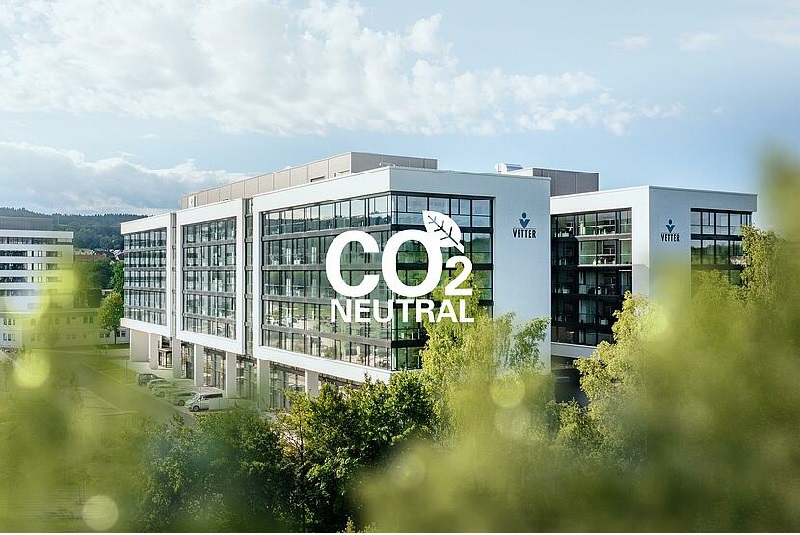Pharmaceutical CDMOs contribution
to climate protection

The "Green Deal" initiated by the European Commission aims at reducing the net emissions of greenhouse gases to zero across the EU by 2050, thereby making the European continent climate-neutral. In response to the increasing pressures to tackle climate change and curb carbon emissions, CDMO companies are moving aggressively towards becoming more sustainable.
Vetter added this topic to its corporate agenda many years ago. Now, the pharmaceutical service provider is making yet another contribution: all Vetter sites are climate-neutral and no longer have a CO2 footprint. The company's production sites and sales offices in Austria, the US, and Asia have followed the example of its sites in Germany, where climate neutrality was already achieved in the past year. This important milestone was made possible by the interaction of many components within the scope of a long-term CO2 strategy in the company.
Over approximately the past ten years, the company has successfully implemented more than 100 efficiency projects, thereby saving over 30 million kWh of electricity, natural gas, and biogas. In the past five years alone, Vetter reduced its carbon dioxide emissions by approximately 4,500 tons. New buildings are always constructed according to the latest environmental standards.
Henryk Badack, Senior Vice President Technical Services/Internal Project Management, stated: "Operating within the pharmaceutical industry, we have to meet numerous regulatory requirements and high standards to enable patients around the world to have access to impeccable, high-quality medication. This results in energy-intensive production operations. Therefore, it is even more important to sensibly compensate for the emissions generated."
Lonza has defined technical measures in consultation with the Federal Office for the Environment (FOEN) so that at the end of 2021 to reduce emissions of nitrous oxide, a waste from niacin production, at its Visp site. Nitrous oxide has the potential to deplete the stratospheric ozone layer due to its photochemical breakdown into reactive nitric oxide radicals. Lonza does not need nitrous oxide to make its products and does not manufacture it on purpose; the substance is a waste in the manufacture of the vitamin niacin. Since nitrous oxide contributes to the greenhouse effect, it has been the subject of increasing attention since 2012 following the revision of the CO2 law. By the end of 2021 at the latest, a catalytic converter will be commissioned for CHF 12 million, which will reduce annual emissions corresponding to around 600,000 tonnes of CO2 by at least 98%.
In the USA Recro Pharma, Inc . announced Tuesday, September 21 the signing of a renewable energy agreement with Georgia Power under which the company will purchase 1.2 million renewable energy credits (RECs) through Georgia Power's Simple Solar Program. The RECs purchased by Recro under this agreement support the generation of renewable electricity from low- or zero-emission resources, while also reducing the emissions associated with the company's electricity use.
As part of Georgia Power's Simple Solar Program, a REC is created for every megawatt-hour (MWh) of electricity that is generated and delivered to the power grid from a renewable energy source. Recro's RECs purchased contribute toward the equivalent reduction of 937,426 tons of carbon dioxide emissions and serve as a key component of the company's ongoing environmental sustainability program.
"Recro is committed to environmental sustainability through our active support of programs and initiatives which reduce our company's impact on the environment. Today's agreement with Georgia Power to support the generation of green electricity is the latest action that Recro has taken in an effort to more efficiently utilize energy, water and materials, while minimizing waste," said Erica Raether, Recro's vice president of people, culture
in 2019, the Recro environment sustainability program has led to estimated annual savings of more than 1.3 million pounds of carbon dioxide (C02) and 300,000 gallons of water.
RELATED ADQ, Abu Dhabi holding companies, acquires Swiss company Acino
